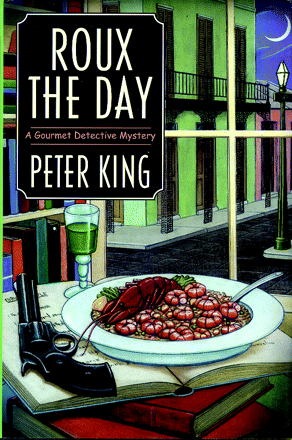Detecting Pharmacology
- Christie Carrico, PhD, Executive Officer for ASPET.
Roux the Day: A Gourmet Detective Mystery

Peter King, New York: St Martin’s Minotaur; 2002. 231 pages. $23.95, ISBN 0312283652
We never know the name of the protagonist and first-person narrator of this culinary mystery novel, only that he goes by a sobriquet the gourmet detective. His specialty lies in tracking down lost recipes and hard-to-find ingredients. In this mystery, set in pre-Katrina New Orleans, he is hired to authenticate a book that is due to be auctioned off in a charity auction. The item in question, which lies at the center of the mystery, is the “chef’s book” from the famous Belvedere’s Restaurant. If authenticated, it is the treasure in which the first Belvedere chef wrote down the recipes that he himself had developed, and in which succeeding generations of Belvedere chefs made annotations and modifications to the recipes, as well as adding their own.
The fictional Belvedere family had dominated the gastronomic scene in New Orleans for five generations, but the doors to the famous restaurant now threaten to remain closed for good. Each owner, over five generations of Belvederes, had ultimately succumbed to mental illness and landed in an insane asylum. The youngest member of the family, Ambrose, in an apparent attempt to avoid the madness that had plagued his family, has allowed the renowned family restaurant to languish, unoccupied. Now, however, there is a rumor that he is going to re-open Belvedere’s, but the chef’s book, with all its essential secrets and famous family recipes, appears to be up for grabs. As it turns out, there are many people in New Orleans who want to get their hands on this book. The attorney who hires the gourmet detective works on behalf of one of these contenders, although the attorney is not at liberty to identify the client.
The gourmet detective arrives at the auction only to find out that the book has been sold, prematurely, to an antique book dealer. Proceeding on to the antique bookshop to speak with the book dealer, our hero encounters only a dead body. This will turn out not to be the book dealer, but a rather colorful individual who used to work for the book dealer. One thing leads to another, and the gourmet detective finds himself kidnapped by a group of female restaurant owners who operate in New Orleans and call themselves the Women in the Catering, Hotel and Eating Services (WITCHES). The savvy and ambitious WITCHES are highly interested in the chef’s book. We also meet Lieutenant Delancey, of the New Orleans Police Department, a transplanted New Yorker who is going to law school in his spare time, when not dealing with crime in the Crescent City. By the time the gourmet detective discovers a second murder victim, he is beginning to suspect that there is more to this chef’s book than just the recipe for the world-famous, inimitable Oysters Belvedere, among others.
As mysteries go, this plot is thin and a bit far-fetched, but suffice it to say that the mystery has a pharmacological solution, which I won’t reveal, so as not to spoil the surprise at the end. While the mystery is modestly entertaining, perhaps half of the novel is devoted to describing the food of New Orleans. Our hero never misses one of his three daily meals nor do we; each one is described in mouth-watering detail, down to the spices used to flavor each dish and the origins of many of the ingredients. I have never read quite as detailed a description of how chicory coffee is made, nor what makes it so unique. Nor had I fully appreciated the difference between Cajun and Creole cooking. In addition to making sure he dines at the staples of New Orleans Commander’s Palace, Arnaud’s, The Court of the Three Sisters the narrator also dines at the various restaurants owned by members of the WITCHES. Some of these feature the expected Cajun and Creole cuisine, whereas others include fusions of Italian/Creole/Cajun, or Chinese/Creole/Cajun. And in case you were wondering what those could possibly taste like, the author supplies culinary descriptions in delectable detail. There are also delightful accounts of the city, parts of which may forever be relegated to reading about in books such as this.
As a homework assignment to prepare for Experimental Biology 2009, which will take place in New Orleans, this book isn’t bad. The only major problem I had with the book was that I stayed hungry the entire time I was reading it.
Peter King was trained as an aerospace scientist and led the team that built the rocket engines for the Apollo space program. It isn’t clear where he got his culinary expertise, but he is clearly an author who loves what he writes about. This is the seventh book in King’s series of the gourmet detective mysteries.
- © American Society for Pharmacology and Experimental Theraputics 2008



